One Basij Member Fatally Shot, Three Injured In Southern Iran Attack
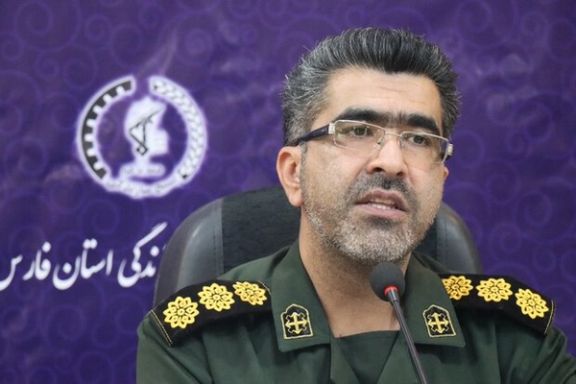
Gunfire by two unidentified assailants in Iran's Fars province on Saturday led to the death of one Basij member and injuries to three others.

Gunfire by two unidentified assailants in Iran's Fars province on Saturday led to the death of one Basij member and injuries to three others.
Esmail Qezel-Sofla, the deputy for political and security affairs of Fars Province Governor Office, provided details of the attack, stating, "The assailants strategically positioned themselves in the southern vicinity of the Nurabad Mamasani and employed hunting rifles to carry out their assault. The victims sustained injuries from the chest upwards, and the perpetrators swiftly fled the scene following the attack."
Intelligence, security, and law enforcement agencies have launched an intensive operation to identify and apprehend the suspects, as stated by Qezel-Sofla who said one of the injured victims has been transported to a hospital in Shiraz, while the remaining two are currently receiving medical treatment at local healthcare facilities. The victims, he said, are "stable".
The armed attack occurs in the midst of a series of attacks targeting military and paramilitary forces in various cities across Iran, against the backdrop of ongoing protests in recent months. The protests emerged in response to the death of Mahsa Amini while in morality police custody and the subsequent suppression of demonstrators. Such attacks have been directed at military personnel, law enforcement officers, and even clerics.
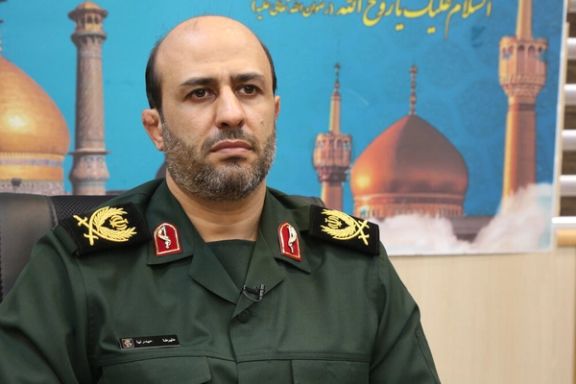
Iran's Revolutionary Guards have claimed they detained a dual national accused of plotting "unrest and sabotage," according to Tasnim news agency.
The incident unfolded amidst heightened security measures aimed at thwarting planned protests, marking the one-year anniversary of Mahsa Amini’s death in morality police custody.
The individual in question, whose identity remains undisclosed, was allegedly found in possession of multiple smartphones and a significant amount of US dollars. The arrest was carried out by the intelligence division of the Revolutionary Guards in the city of Karaj, situated to the west of the capital, Tehran. The information was relayed by the news agency, citing its correspondent on the ground.
The recent detention occurs in the context of Iran's forthcoming release of five Iranian-American detainees, facilitated by a Qatar-mediated agreement with the United States. This agreement also encompasses the release of five Iranians held by the United States and the unfreezing of $6 billion in frozen Iranian funds held in South Korea.
In a separate development, a few days ago, the Ministry of Intelligence of the Islamic Republic of Iran declared the arrest of several leaders associated with anti-Iranian gatherings outside the country. However, specific details and the identities of these detainees were not disclosed.
Over the past few years, Iran's Revolutionary Guards have detained numerous dual nationals and foreigners, primarily on charges related to espionage and security. Human rights organizations have accused Iran of using these arrests on security grounds as a diplomatic bargaining chip to secure concessions from other nations, potentially based on questionable allegations.
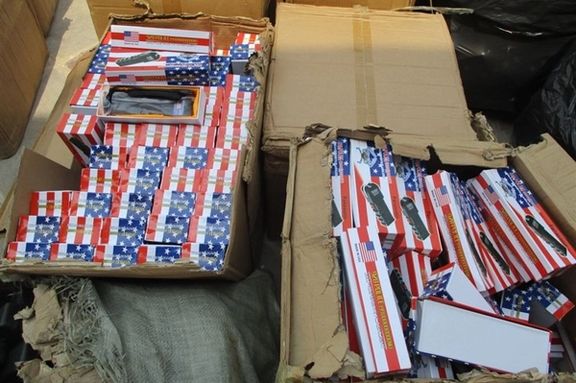
Amid a tense situation in Iran on the anniversary of last year's anti-regime protests, the government claims that it seized “American weapons and gear” entering the country.
The official government news website IRNA quoted an official in the southern Hormozgan Province on the Persian Gulf as saying that “a large consignment American-made instruments was discovered as it was entering Iranian waters, including thousands of electric shockers specially designed to be used by rioters,” on board a vessel.
The website published a photo showing two cardboard commercial boxes full of smaller packaging fully covered with American flags, full of what appeared to be small electric shockers. It did not show any weapons as IRNA claimed in its report.
These could well be merchandize produced in Pakistan and other regional countries that are freely available in Iranian bazaars.
Iranian regime officials in the past have regularly claimed seizure of weapons and terrorists, rarely producing any convincing evidence.
Since the beginning of protests in September 2022, officials taking their cue from Supreme Leader Ali Khamenei have blamed the United States and its allies for fomenting unrest in Iran. Many people detained for posting news or images on social media have been accused of “collaborating with the enemy.”
The chief of the judiciary department in Hormozgan claimed that the consignment was identified and followed before being loaded on the vessel “by the exact intelligence work and was seized immediately upon entering Iranian waters.”
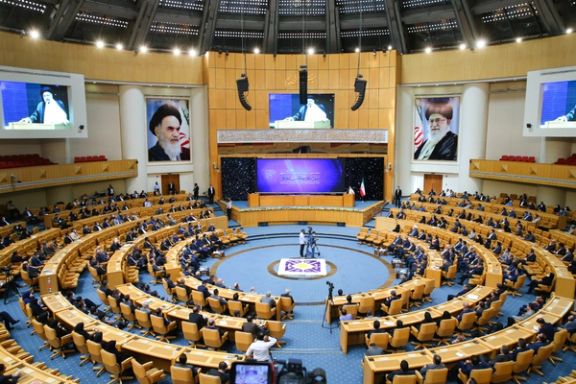
Iranian politicians have revealed further corruption among individuals involved in Iran’s shady privatization policy, which is widely criticized by the media.
Critics see a hasty plan to sell off government properties and companies as a way of "plundering Iran’s resources in the course of liquidating the country’s national assets."
Conservative news website Alef has quoted Ahmad Tavakkoli, the head of the Iranian NGO, Transparency and Justice Monitor, as saying in a letter to lawmakers, the heads of the three powers of the government and the privatization board that the plan "should be totally rejected."
The media reported in January that Vice President Mohammad Mokhber, Economy Minister Ehsan Khandouzi, Interior Minister Ahmad Vahidi, Roads Minister Mehrdad Bazrpash, and four other officials will form the Privatization Board. Reports at the time said that an order issued by the heads of the three powers of the government bars critics of disclosing details of transactions and suspends for two years all legislations that might prevent these transactions.
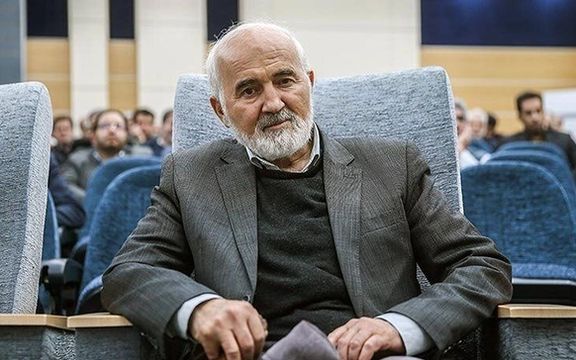
The members of the Privatization Board have asked for immunity against all criticism and possible legal prosecution.
The scheme is reminiscent of previous privatization efforts that led to huge corruption cases, when people bought public assets at a fraction of their market value often simply to sell valuable lands or borrow large sums from banks against the assets.
Tavakkoli, who is also a member of Iran's Expediency Council, a non-elected body whose members are appointed by Supreme Leader Ali Khamenei, also said that Khamenei has revoked his endorsement of the privatization plan. Tavakkoli is an established conservative politician, who belongs to the ‘principlist’ camp, which has lately been overshadowed by ultraconservatives who control the parliament and President Ebrahim Raisi’s administration.
While the plan is presented as an effort to make the economy more efficient and raise money for the cash-strapped government, critics believe there are powerful people involved whose only interest is to buy valuable lands at low pieces.
Criticizing Raisi’s privatization and other economic plans administration, Tavakkoli said the economic situation is so bad that "If an average Iranian worker saves one third of his monthly income to buy a house, it will take him 135 years to be able to afford buying one." He further warned that if the government undertakes to implement the shady privatization plan, this will be an end to many Iranians' hope to own a house."
Stressing that this is the third letter he is writing about privatization, Tavakkoli further warned that this plan will entail heavy losses and other consequences for the Islamic Republic as it extensively violates the rights of the nation.
Echoing previous warnings by other politicians and commentators, Tavakkoli argued that the plan will create new opportunities for corrupt individuals. He further accused the seven high-ranking members of the privatization board of planning to take advantage of their immunity before the law to spread financial corruption.
Meanwhile, former deputy culture minister Hossein Entezami in a tweet on Friday called Tavakkoli's letter "shocking." He added that "the seven members of the Privatization Board and their colleagues who enjoy permanent immunity from prosecution, have [so far] received 54 trillion rials ($108 million) for working on the board." He added: "I wish Vice President Mohammad Mokhber and Parliament Speaker Mohammad Bagher Ghalibaf will cease to insist on implementing the privatization plan."
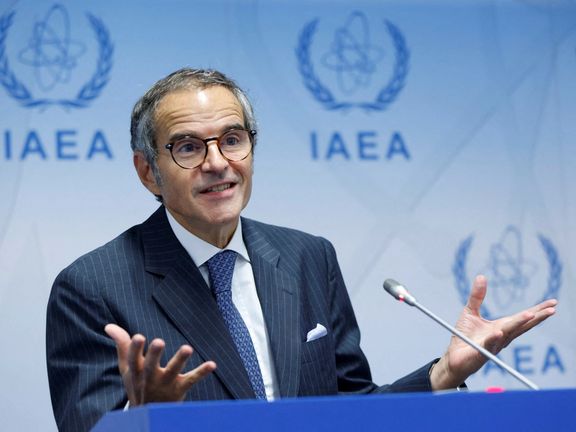
Iran has withdrawn the designation of several inspectors assigned to conduct verification activities in Iran under the Non-Proliferation Treaty Safeguards Agreement.
Rafael Grossi, Director General of UN nuclear watchdog, International Atomic Energy Agency (IAEA), made the rare public statement on Saturday amidst the national rallies taking hold in Iran and abroad around the one-year anniversary of the death of Mahsa Amini.
It is the latest move to stonewall inspectors by the Iranian regime, which just recently withdrew the designation of another experienced IAEA inspector for Iran.
“With today’s decision, Iran has effectively removed about one third of the core group of the Agency’s most experienced inspectors designated for Iran,” Grossi said in a statement.
“This measure, while formally permitted by the NPT Safeguards Agreement, has been exercised by Iran in a manner that affects in a direct and severe way the ability of the IAEA to conduct effectively its inspections in Iran.”
Grossi strongly condemned Iran's "disproportionate and unprecedented unilateral" decision, saying it will affect the IAEA's verification activities in Iran.
He admitted that it is both “a step in the wrong direction” and “constitutes an unnecessary blow to an already strained relationship between the IAEA and Iran in the implementation of the NPT Safeguards Agreement”.
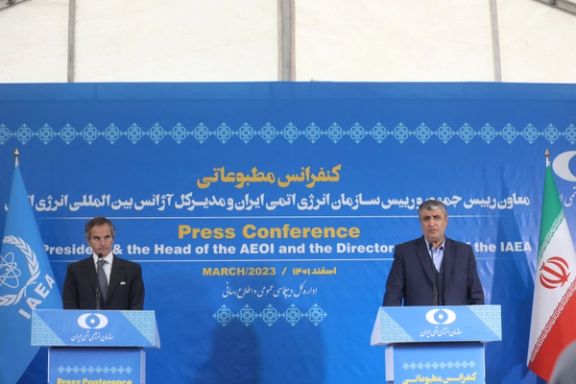
In reaction to the IAEA statement, Iran's Foreign Ministry spokesman said the country's decision to withdraw the designation of several IAEA inspectors is based on its rights under the Article 9 of Iran-IAEA Safeguards Agreement (INFCIRC/214).
Earlier this week, another meeting of the Board of Governors of the IAEA continued with no effective step to address the questions surrounding Iran’s nuclear program.
Iran is known to have expanded its program significantly since 2018, when the United States unilaterally withdrew from the Iran nuclear deal – or Joint Comprehensive Plan of Action (JCPOA).
On Wednesday, three signatories of the deal, UK, France, Germany (E3) delivered a joint statement at the IAEA Board of Governors meeting, in which they condemned Iran’s lack of transparency with regards to its nuclear program.
However, despite their emphasis on Iran’s non-compliance, the E3, much like the US, fell short of introducing measures that would ensure Tehran’s cooperation with the IAEA. On the contrary, just in August the Biden administration agreed to release $6 billion of Iran’s funds blocked in South Korea due to US sanctions, in exchange for five US citizens held hostage in Tehran.
In the State Department’s press briefing Wednesday, Spokesperson Matthew Miller refused to comment on why a resolution condemning Iran’s non-cooperation was not introduced at the IAEA meeting. Pressed by a reporter, Miller said the Biden administration would only work with other members “to clearly express that Iran should cooperate fully with the IAEA.”
This was in line with a joint statement delivered to the IAEA Board of Governors meeting on behalf of the US and 62 other member states, including all EU countries, Turkey, Kuwait and Saudi Arabia.
In January, IAEA inspectors at Fordow detected undeclared centrifuge configuration changes as well as particles of uranium enriched up to 83.7%. In March, Grossi visited Iran and brought back an agreement that was hailed as a breakthrough by both sides but deemed insufficient and non-binding by its critics.
The agreement (or the Joint Statement) stood on the premise that Iran had “expressed its readiness” to “provide further information and access” and “allow the IAEA to implement further appropriate verification and monitoring activities” on a “voluntary” basis.
Six months on, the premise seems to have been shaky at best. According to the IAEA, Iran has accumulated enriched uranium (5-60%) far beyond JCPOA limits
Iran continues enrichment in Fordow, where inspectors detected undeclared particles of uranium enriched at 83.7%.
In Saturday’s statement, Grossi urged the regime to come back to the table. “Without effective cooperation, confidence and trust will continue to be elusive and the agency will not be in a position to discharge effectively its verification mandate in Iran and provide credible assurances that nuclear material and activities in Iran are for peaceful purposes,” he said.
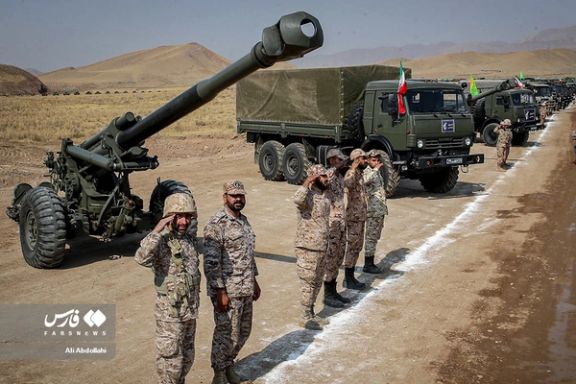
Israeli intelligence claims Iran's elite combat force, the Imam Hossein Division operating within Syria, has been surreptitiously storing advanced weaponry in residential neighborhoods and soccer fields.
According to reports from WallaNews, the force -- linked to the Quds Force of Iran’s Revolutionary Guards (IRGC), comprised of 1,000 seasoned weaponry experts equipped with an extensive arsenal of drones and missiles, has been actively engaged in Syria, where it has also integrated 5,000 foreign fighters into its ranks.
The foreign mercenary fighters, hailing mainly from Nigeria, Mali, Niger, Lebanon, and Afghanistan, were recruited, and trained for their roles, primarily geared towards religious warfare, added the report.
In exchange for their service, they receive monthly salaries in the hundreds of dollars, along with access to cutting-edge weaponry.
The division's operational structure comprises 5,000 mobile fighters who are mainly active in regions between Aleppo, Homs, and along the Turkish border. They are tasked with combating local resistance pockets opposing the Assad regime within various cities.
Over the past year, the Imam Hossein Division has been consolidating its infrastructure and establishing headquarters in and around Damascus. Additionally, the division has conducted several operations against Israel.
The IDF's intelligence branch is closely monitoring the activities of the heavily armed Iranian militia, particularly for any plans that may pose a direct threat to Israel, read the report.






